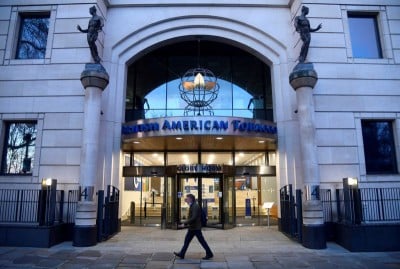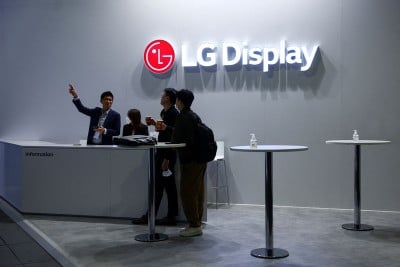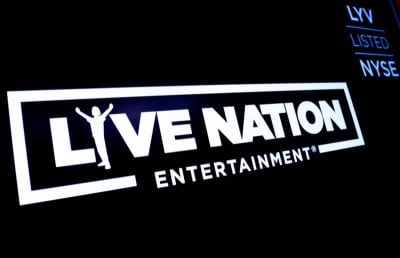 © Reuters. FILE PHOTO: Signage is seen at the London offices of British American Tobacco, in London, Britain, January 15, 2021. REUTERS/Toby Melville/File Photo BATS -8.36% Add to/Remove from Watchlist Add to Watchlist Add Position
© Reuters. FILE PHOTO: Signage is seen at the London offices of British American Tobacco, in London, Britain, January 15, 2021. REUTERS/Toby Melville/File Photo BATS -8.36% Add to/Remove from Watchlist Add to Watchlist Add Position Position added successfully to:
+ Add another position Close BTI -8.50% Add to/Remove from Watchlist Add to Watchlist Add Position
Position added successfully to:
+ Add another position Close PM -1.55% Add to/Remove from Watchlist Add to Watchlist Add Position
Position added successfully to:
+ Add another position Close IMBBY -1.26% Add to/Remove from Watchlist Add to Watchlist Add Position
Position added successfully to:
+ Add another position Close
By Emma Rumney
LONDON (Reuters) -British American Tobacco's admission that its U.S. cigarette brands will be worthless within decades has ramped up pressure on the company to prove it can better compete in alternatives like vapes.
Earlier on Wednesday, BAT (LON:BATS) put a 30-year lifetime on some U.S. tobacco brands' value, taking a $31.5 billion noncash impairment. The move marked the first time a tobacco company has acknowledged that hugely profitable brands have no economic future.
While the maker of Lucky Strike and Dunhill cigarettes has been investing in alternatives like vapes to counter the decline, it lags behind rival Philip Morris International (NYSE:PM) in the transition, leaving its shares trading at a vastly lower price-earnings ratio than those of its main competitor.
"What really matters to the stock is how quickly you can replace (cigarettes) with alternative routes for consumers to get a nicotine hit and how profitable that will be," said Chris Beckett, head of equity research at Quilter Cheviot, a BAT shareholder.
BAT says its newer products will break even years ahead of schedule. Its vape business is growing, along with its oral nicotine product, Velo, the market leader in Europe.
However, it faces key challenges.
In the critical U.S. market, authorities have rejected its application to sell some key vape products and illegal disposable vapes have flooded the market, denting sales of those products BAT is able to market.
The company is also under pressure from investors to catch up with rival PMI in another alternative, heated tobacco.
Heated tobacco devices heat up sticks of tobacco resembling cigarettes but do not burn them in an attempt to avoid harmful chemicals released during combustion.
PMI's IQOS product dominates this category with some 70% market share. BAT's rival proposition, meanwhile, lost market share in 2023 in terms of volume, to stand at 18.2% in key markets, the company said, adding that its volume and revenue growth decelerated in the second half in a "disappointing" performance.
LATE ENTRY
It is harder for companies to generate profit from vapes due to intense competition, said Orwa Mohamad, analyst at Third Bridge. BAT's late entry into heated tobacco had left it at a disadvantage and an aggressive pricing strategy aimed at winning share from IQOS had yet to bear fruit, he added.
Where PMI expects two-thirds of its net revenue to come from smoke-free products by 2030, BAT's ambition, announced on Wednesday, envisages only 50% of its revenue from new categories by 2035.
Its slower progress versus PMI means BAT's shares have gained little value so far from its commitment to transition, trading at a price-earnings ratio only slightly above that of rival Imperial Brands (OTC:IMBBY).
Unlike the others, Imperial has in recent years pulled back from heavy investments in new products to refocus on its traditional cigarette business, leaving a question mark over its longer-term sustainability.
At the same time, BAT is now falling short of Imperial on something investors have long expected from highly cash-generative cigarette businesses: healthy dividends and share buybacks.
Cigarette businesses are so profitable they do not need to last beyond 30 years to make worthwhile investments, Beckett said, adding Imperial's share buybacks are evidence of that.
Imperial's delivery on this core element of tobacco companies' investment case has helped its shares outperform rivals in recent years, rising 17% since the start of 2022. That compares with 1% for PMI's stock, and a decline of 13% for BAT.
BAT, meanwhile, disappointed the market on Wednesday when it said it would need to reduce its leverage ratio further before buybacks could resume.
A buyback would be "amazingly enhancing" to the stock, Beckett said.








